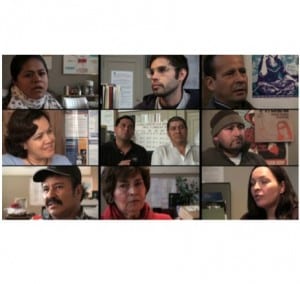“In Bangladesh, the camera crew slept on mats in huts, side-by-side with villagers who are using micro-lending to pull themselves out of abject poverty. In the county jail in Benton Harbor, Michigan, they were behind bars with the inmates — mothers whose lives, and the lives of their children, have been blighted by drugs. In Tanzania, they laughed with lepers whose illness is being stemmed through the good will of Novartis Foundation, which brings healthcare services and medicines to the poor of the Third World. And to film victims of wage theft — in just one week in Chicago, workers lose $7 million in unpaid wages — they spent 18 months getting to know cheated workers.”
“Every episode ends with a Vincentian challenge: What can you do about this issue? How can you actually change the world?””
“This project started with our frustration about writing case papers,” says Clark. “Could the camera tell a story in a different, perhaps better, way? Our first foray — to Bangladesh — was so successful that we starting looking for other situations to document, other windows to look through. In doing that, we found multiple fault lines or tipping points where people are effectively challenging poverty and promoting social justice through small actions.”
The Bangladesh documentary caught the attention of WNIT, the public television station in South Bend, Indiana, which recognized the content as fresh and — even more telling — as seismically important. The station suggested a six-episode series.
“The films are not didactic, but they are teaching tools,” says Clark. “We don’t create situations: we film what we see. So far, we’ve documented micro-lending in Bangladesh, telemedicine in Ghana, school building in Haiti, a leper colony in Tanzania, a women’s jail in Michigan, and wage theft in Chicago. In every case, we entered these worlds with a Vincentian sensibility.”
Werhane elaborates: “Our purpose was always to record real-world, sustainable actions that are alleviating poverty, suffering, and injustice. Every episode ends with a Vincentian challenge: What can you do about this issue? How can you actually change the world?”
Scott Arakawa (BA ’11) — hired to edit footage into smaller, discussion-friendly chunks for the TV series — stresses the importance of being inconspicuous during the actual shooting:
“We didn’t want to distract people with the filming process itself; rather we wanted our subjects to be comfortable and natural in showing and telling their stories. So, we had to stay in the background. To do that, we developed a versatile, compact kit of small cameras, small tripods, and portable audio gear. Because we were unobtrusive, people were not intimidated.”
In Bangladesh, the camera crew slept on mats in huts, side-by-side with villagers who are using micro-lending to pull themselves out of abject poverty. In the county jail in Benton Harbor, Michigan, they were behind bars with the inmates — mothers whose lives, and the lives of their children, have been blighted by drugs. In Tanzania, they laughed with lepers whose illness is being stemmed through the good will of Novartis Foundation, which brings healthcare services and medicines to the poor of the Third World. And to film victims of wage theft — in just one week in Chicago, workers lose $7 million in unpaid wages — they spent 18 months getting to know cheated workers.
“The why of what we’re doing is as important as the what — and that’s consistent with DePaul’s culture,” says Clark. “Also, this project illustrates the value of cross-college collaboration: Pat comes from the Driehaus College of Business; Scott, our sound technician, and our cameraman are graduates of the film school in the College of Computer and Digital Media; and I teach in the College of Communication.”
“I met Kim at an Ethics across the Curriculum seminar, so this project reflects our connection as colleagues and teachers at DePaul,” Werhane agrees. “We’re using the films in classes on ethics, media, and philosophy.”
The series Big Questions will be aired on WNIT (South Bend, Indiana) in 2013. In each episode, an audience views film segments (which include commentary by experts), and then asks questions of Werhane, Clark, and Laura Hartman (professor and Vincent de Paul Professor of Business Ethics).
Here are trailers or segments for some of the stories:
Micro-lending in Bangladesh:
http://www.youtube.com/watch?v=rxIV8FsZfUY&list=PL5ADC321855F6AD67&feature=mh_lolz
A leper colony in Tanzania:
http://vimeo.com/25088886
A women’s jail in Michigan:
http://vimeo.com/29625465
Wage theft in Chicago:
http://vimeo.com/26043786

